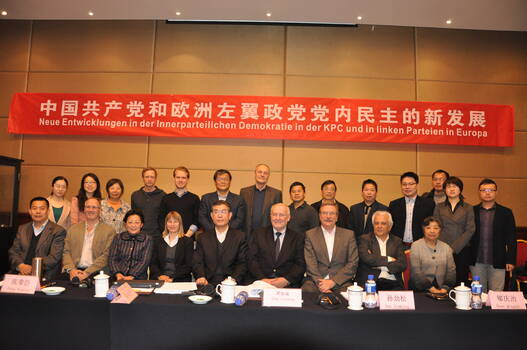
On 19th and 20th April 2013, scholars and political activists from the People’s Republic of China and the Europe have met in Beijing to discuss "recent developments of inner-party democracy in the Communist Party of China and left-wing parties of Europe". The event was organized by the office of the RLS in Beijing and its Chinese partner "Central Bureau for translation and compilation at the Central Committee of the Chinese Communist Party" (CCTB).
From the contributions and the discussion of both the Chinese and the European participants, it became clear that the need for new approaches to participation and codetermination of party members and supporters in left-wing parties are very high. The initial situation and structures of the parties which were under discussion are very different, e.g. the number of members of the Communist Party of China is growing for decades. It has now more than 82 million members, making it the largest member party in the world. According to Prof. Zhou Shuzhen from the Renmin University in Beijing, it is obvious that party members call for more influence and participation and that the component of 'Democracy' in the prevailing understanding of the party of the course of "democratic centralism" must be strengthened. In Europe, however, traditional parties are not only losing their ideological profile and voter confidence, but also their base: only 1.3 million Germans are members in a party, the renowned party researcher Elmar Wiesendahl has calculated; 69.000 are members of the party "Die LINKE". The financial and debt crisis in the EU is also a crisis of the political system and the massive social protest is not organized in the context of traditional left parties. They must watch rather not to lose the connection to the protest movements and their grassroots democratic structures, stated Cornelia Hildebrandt of the RLS. As successful models of member participation and openness to the outside the "new policy (communication) room" of the Pirate Party, described by Michael Paetau, as well as the concrete anchorage of the radical left in the Greek protest movement came, portrayed by Thedoros Paraskevopoulos (Syriza) with great interest to the Chinese participants.
In contrast to the European left-wing parties, the Chinese Communist Party is the ruling party in China (Zhou Shuzhen) for a long time and sees itself in a long-term process of transformation from a revolutionary to a ruling (national) party. Similar to European political parties, it is facing the challenge to represent the interests of the widest parts of the population and at the same time to give a clear profile. The contributions of Felix Butzlaff (University of Göttingen) and Elmar Wiesendahl, gave suggestions for an intensive, in-depth discussion with the Chinese participants. Inner-party democracy is to ensure control of government and detection of corruption, it is for more active involvement of its members and more transparency of decision-making, the Deputy Director of the Institute of translation, Prof. Wang Xuedong said. Prof. Zhang Rongcheng from the Central Party School in Beijing said, electoral procedure, legal security for members and structural reforms aimed at the democratization of the party are in the foreground. Another focus of the contributions and discussion was how the Communist party uses new communication technologies, as well as professional instead of ideological training. Thus, so the speakers Zhang Xiaojin (Qinghua University Beijing) and Gong JiaCheng (Organizational Department of the Central Committee of the Communist Party) the party is trying to keep pace with the complex development of Chinese society and steer it.